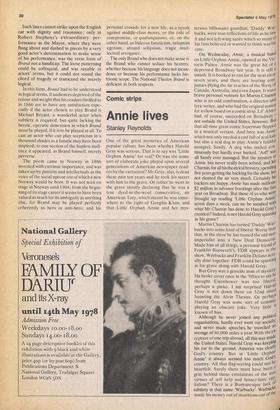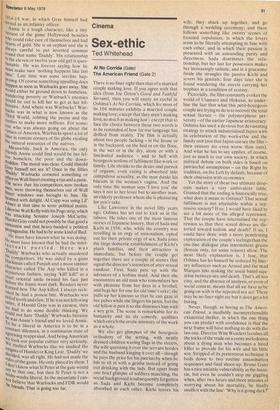Comic strips
Annie lives
Stanley Reynolds
One of the great mysteries of American popular culture has been whether Harold Gray was serious. That is to say was 'Little Orphan Annie' for real? Or was she some sort of elaborate joke played upon several generations of American newspaper readers by the cartoonist? Mr Gray, alas, is dead these past ten years and he took his secret with him-to the grave. Or rather'he went to the grave stoutly declaring that he was a true dyed-in-the-wool conservative, an American Tory, which meant he was somewhere to the right of Genghis Khan, and that Little Orphan Annie and her mys
terious billionaire guardian, 'Daddy' War' bucks, were true reflections of life as he sat" it and not left-wing satire which so many of his fans believed or wanted to think was the case.
On Wednesday, Annie, a musical based on Little Orphan Annie, opened at the Vie' toria Palace. Annie was the great hit of a depressed Broadway last year. It is still a smash. It is booked to run for the next six or seven years, and there are touring cool' pan ies plying the far reaches of the West, of Canada, Australia, and even Japan. It was a brave personal venture for Martin Charnin who is an odd combination, a director and lyric writer, and who had the original notion for a show based on a comic strip. Lir Abner had, of course, succeeded on Broadway " not outside the United States, however. But that all-time great comic Superman flopPO in a musical version. And here was An which not only needed a cast full of real kids but also a real dog to play Annie's faithful mongrel, Sandy. A dog who smiled con' tinuously but hardly ever barked. 'Ad!' was, all Sandy ever managed. But the mysterY Annie has never really been solved, and Mr Charnin, for all his theatrical bravery, spending five years getting the backing for the show, 1105 not cleared the air very much. Certainly his backers are happy. Annie has made millions: $2 million in advance bookings after the first year on Broadway. But those of us who were, brought up reading 'Little Orphan Annie,. seven days a week, can we be satisfied wit1,1 what Mr Charnin has done to Harold GraY 5 creation? Indeed, is not Harold Gray spinning in his grave?
Martin Charnin has turned 'Daddy' War' bucks into some kind of liberal. Worse than that, in the show he has turned the old nen" imperialist into a New Deal Democrat. Made him of all things, a personal friend of Franklin Roosevelt's. FDR appears in the show. Warbucks and Franklin Delano actir ally dine together. FDR could be spinning in his grave along with Harold Gray. But Gray was a genuine man of mysterY• He broke cover once in the 'fifties to say he thought Eisenhower was too liberal, perhaps a pinko. I am surprised Harold Gray is not down there on 52nd srre_et ' haunting the Alvin Theatre. Or pedlacr Harold Gray was some sort of cominte.' playing an obscure joke. Very little Is known of him. Although he never joined any political organisations, hardly ever went out sociallY' and never made speechet he travelled an average of .40,000 miles a year. With thezg" ception of one trip abroad, all this was inside the United States. I-larold Gray was keeping his ear to the ground. America was elearlY "God's country. But in little Orphan Annie' it always seemed too much God's country. All that flag-waving could not be heartfelt. Surely there must have been a grin behind those extolations of the iron virtues of self help and laissez-faire eaP; italism? There is a Bunyanesque lack 0' subtlety in that name Varbucks'. Warbuc0 made his money out of munitions out of the 1914-18 war, in which Gray himself had served as an \ infantry officer. Annie is a tough character, like a tiny version of the game Hollywood beauties Who could take care of themselves and had karts of gold. She is an orphan and she is always careful to put inverted commas round that name 'Daddy'. His relationship tp the eleven or twelve year-old girl is questionable. He was forever saying how he ust make sure 'nothing happens like last time'. Last time was some terrible hapPeuing. Of course something appalling does "aPlien as soon as Warbucks goes away. She would either be ground down to homeless, wandering poverty or Warbuck's enemies Would be out to kill her to get at her billionaire. And where was Warbucks? Warhacks was in what is now known as the Third World, robbing the peons and the coolies to make more millions. For some°Pe who was always going on about the virtues of America, Warbucks spent a lot of titrie in remote corners of the globe stealing the natural resources of the natives. Meanwhile, back in America, the only .1riends Annie could find would be her fel10s'y homeless, the poor and the downt‘trodden. The moral was clear. Could Harold ‘3,,,,raY himself not see it? Once in the fifties Warbucks cornered something or heron Wall Street creating a run and a panic. the news that his lcompetitors, now:broken RIM were throwing themselves out of Wall Sbtereet windows was brought to him. He amed with delight. Al Capp was using Lir Abner at that time to score political points. ,..1"tkewise Walt Kelly with his Pogo strip, which o attacking Senator Joseph McCarthy. rlarold Gray could not possibly be that good a cartoonist and that heavy-handed a political Propagandist He had to be some kind of Red. He must have known what he was doing. re must have known that he had the intelact uals puzzled. Here was
Warbucks who actually murdered
hi,' competitors. He was aided by a giant utaekman called Punjab and a most sinister character called The Asp who killed in a alYsterious fashion, saying 'kill! kill!' as a cruel oriental smile twisted his face just :)efore the frame went dark. Readers never I
earned how The Asp killed. I always reek
fled he had a poison bite. Warbucks was red of tooth and claw. If he was not left-wing satire, if Harold Gray was in earnest, then We had to do some double thinking. We ebtluld not hate 'Daddy' Warbucks because -re was Annie's friend and we loved Annie. ° be a liberal in America is to be in a e°hstant dilemma, in a continuous state of apnising reappraisal. And being American
took our popular culture very seriously.
e studied Warbucks like we studied the c,Pigina of Hamlet or King Lear. 'Daddy' we "eeided, was all right. He had not made the 1tmles of the game. He only played by them. I s don't know what St Peter at the gate would to that one, but then St Peter is not a „"tshY-Washy liberal. In the meantime I canrt believe that Warbucks and FDR would °e friends. That is going too far.







































 Previous page
Previous page